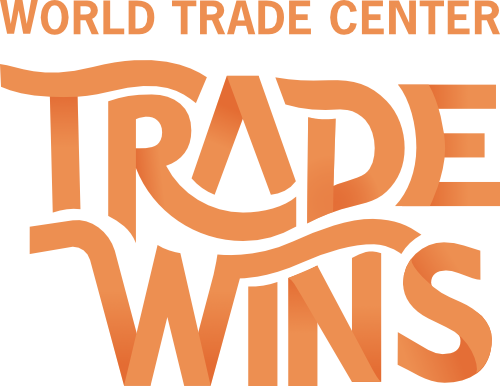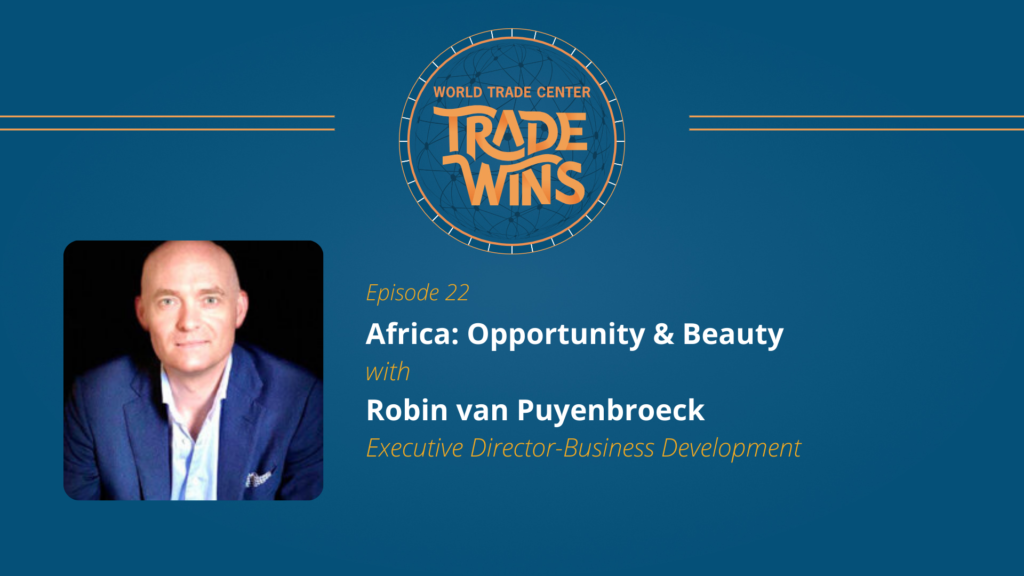Robin van Puyenbroeck 0:08
Welcome back to Trade Wins. I’m Robin van Puyenbroeck, your host, and today my conversation is with António Manuel Silva Santos, the anchor of RTP Portugal and the national broadcast system for Africa. RTP Portugal has an audience of over half a million listeners, located within mainly the Portuguese-speaking nations across the African continent such as Angola, Mozambique, Cabo Verde, Guinea-Bissau, Equatorial Guinea, and São Tomé and Príncipe as well as Brazil. And we will be talking about international trade, of course, Africa and agriculture, and our World Trade Centers in Africa. Here comes my conversation.
António Manuel Silva Santos 0:50
Robin, countries like Somalia, Kenya, Ethiopia, and Eritrea, are facing severe drought for the last two years, the respective agriculture sectors are affected. Food storage doesn’t exist. How can the World Trade Center support trade in situations like this?
Robin van Puyenbroeck 1:09
António, thank you for the question. I think it’s a very important question. There are two different components. One is the pain points that you addressed, which is the drought and the lack of production and sort of the yield gap that exists in agriculture. And I think it’s probably important to look at it from the bigger picture, when you look at agriculture in general, for Africa, the food market for Africa is about $750 billion a year. And it is expected to grow about 6% per year, which is double the growth rate than the international market. And it is largely due to a growing population, of course, and the growing urbanization. By, I think, 2025, I believe 45% or even half of people in Africa would like to live in cities. So on the one hand, you will have a growing demand because of those factors. And at the same time, you’ll have more and more challenges on the supply side. And Africa has some very particular challenges. When it comes to this, I believe the World Bank came out with a report and about 650 million people and almost half the population of Africa are facing food insecurity. And the countries that you mentioned are, of course, sadly, some examples. And part of the challenge is that about 90% of the food production, and the distribution in African countries is domestic. So, if you then also look at the vast majority of those producers, they are small- and medium-sized companies and farmers. So when you ask the question about drought in certain countries and the challenges they bring, it’s also related to the fact that there’s almost no intra-African trade in agriculture. I believe the number from the African Development Bank has put a number on inter-African trade for food at merely, I think about $30 billion. So if you then look at how much that represents of the total food market, it’s a tiny piece. So how can we address the shortages in certain countries where the domestic production is even getting into trouble. Where now we’re having issues with imports as well, the prices have been rising up to sometimes 50% in the past couple of months from international markets. So it’s really almost the perfect storm happening here. But it’s about the very essential product, it’s a food product, it’s a food commodity. So because it’s not a disposable product. So it’s a very serious question to address. Now, what can World Trade Centers do in a situation like this? So the World Trade Center that’s located is really, we were an international trade association. And our mandate is to promote and facilitate international trade and development. So this is what our World Trade Centers, the 321 of them all around the world, almost 100 countries, they each have their own ecosystem of business partners with a company that they work with in the immediate environment. So what World Trade Centers concretely can do here is work with their business partners around the world we have centers in Egypt, in Algeria, in Ivory Coast, in Nigeria, in Morocco, in Ghana, to focus, to work with the companies in their network with the international partners in the network, to focus on that intra-African trade component. So, how can companies in certain countries in Africa, go and trade and do business in other countries of Africa, to stimulate, to kickstart that economy, and that would partially address the issue,to sort of just insert other countries. So the key really is to summarize, how can we stimulate and promote more intra African trade and especially in fields near agriculture? I hope that answers your question.
António Manuel Silva Santos 5:03
Yeah, I like the answer. Africa’s a big continent and the pandemic greatly impacted African culture’s economy. Is it possible to invest in Africa without losing money, Robin?
Robin van Puyenbroeck 5:15
Well, that’s a very tricky question, António. I think many places in the world, the whole world, were impacted greatly because of the pandemic. Is it possible to invest in Africa without losing money? I would say I would ask the same question anywhere else in the world? Right. So this is not, I think Africa is a very investable place. I think it’s all about doing business right. Now, whether you go to Latin America, North America, Europe, Asia, Africa, at the end of the day, whether a company is able to make a good return and make money is largely dependent on how the company is being run. And how the company can manage the whole range of risks, regulatory risk, business risk, and what have you. So I think, again, that there’s a lot of opportunity to make money in Africa, and investment decisions have always to be made based on, you know, what kind of business you’re in and a specific country or area that you’re looking to invest in.
António Manuel Silva Santos 6:10
Robin Puyenbroeck, let’s talk about the World Trade Centers across Africa. How can they support the trade and business opportunities coming from European, American, and Asian investors? How can these things happen?
Robin van Puyenbroeck 6:23
Well, António, that’s a very good question. I think the good news here is that things are happening. So how concretely does this work? So the World Trade Center, for example, in, let’s say, Accra, in Ghana, they would call a World Trade Center in Sao Paulo, in, in the Netherlands, in New Delhi, in China, all around the world, they have the environment of trust, and they discuss how they can work on trade facilities. So there are, for example, members right here in the United States that have a very particular focus on Africa, they will reach out to our members in Africa and say, I have companies here in my city, in my area, with an interest in Africa. Can we do a trade delegation? Can we find matches for companies I have on my side here in the U.S. with companies that you have in your city. So these trade delegations are happening, and we’ve done more trade delegations last year than ever before, most of them, of course, virtually, but also that has worked. So the World Trade Centers, truly those connecting points, for the cities in Africa, where we have World Trade Centers, with the other 300 World Trade Centers all around the world, these connections, these investments, they are happening. And of course, that is exactly what supports the trade opportunities in Africa, because it all happens in an environment of trust. There is a World Trade Center in Africa working with the World Trade Center elsewhere in the world, to bring their respective business partners together. So again, this is happening. And we are very much focused on growing our footprint in Africa, we would like to open many more World Trade Centers on the continent. So the more we can increase our footprint with World Trade Centers in Africa, the more traction we can also get and create opportunities throughout the continent.
António Manuel Silva Santos 8:10
Robin, do the World Trade Centers exchange know-how and provide workshops to upgrade the skillset of workers across African countries?
Robin van Puyenbroeck 8:18
That’s a very interesting question because the whole notion of education and information is critical. I think that the level of knowledge around the world about opportunities in Africa, about doing business in Africa, it’s still very limited. And it couldn’t be if you look at the opportunity with the Africa Continental Free Trade Area. This is a tremendous initiative, with so much potential. But it’s very little known. So we are now focusing, we had our General Assembly last week where we really focused on opportunities in Africa and with Africa. And it was also all about providing that information about what is the Africa Continental Free Trade Area here. And what can it do for companies around the world, not just for companies within Africa for intra-Africa trade, but also for companies elsewhere in the world? How can they use the opportunity of this new infrastructure, of this new framework to come to Africa and do business, so our World Trade Centers have definitely an important role to play in providing that information and providing training. So the training itself, what you mentioned, is done at the level of each individual World Trade Center. Some provide very specific trade education, they even have trade programs. Others do something different. So it really depends on each individual World Trade Center, what kind of training or information they provide. But the question that you asked about the need to provide information, I think it’s very important, not just at the interpersonal skills level, but also from a broader perspective, talking about opportunities that are available in Africa to grow a business. I mentioned the African Continental Free Trade agreements, but also, for example, which is another point of discussion, companies needing financing and funding to be able to grow. So what kind of services and products can, for example, the African Development Bank provide. I think there’s very little knowledge about the tools that are available there as well. So these are all, I think, very, very important components when it comes to providing education and information.
António Manuel Silva Santos 10:22
Robin, one last question, what do you expect from the world economy in this particular time of pandemic and so on, the war in Eastern Europe? Is it going to grow or do you expect inflation to slow it down?
Robin van Puyenbroeck 10:35
Well, that is a very good question, António. I wish I had the answer to that. Let’s just look at some of the data points here. I think the world’s population keeps growing. But what a year – we have a bit of a perfect storm where there’s a lot of issues in the supply chain, all around the world, as you know. And the hiccups are not on the demand side. They’re really on the supply side – shortages of labor, shut downs, there’s of course, there’s conflict happening in the world, there are more people, more countries wanting a certain product that is less and less available so the price goes up. So I think the economy will keep growing. There is no other, there is no other way just because the world population is growing. I think, of course, discretionary spending will go more and more to essential goods, like food products, and less to pricier products just because prices go up and people, we will see a shift in their income levels – they are not necessarily going to grow at the rate of inflation. But the global economy is definitely not out of the woods. And certain continents like Africa did not benefit from the liquidity that was made available in North America and European and Asian markets. So, again, I do see the economy continuing to grow, but there are definitely a lot of red flags when it comes to inflation which will also continue to rise until you come to a more stable environment.
António Manuel Silva Santos 12:06
For you, Robin, the last question: define Africa in just two words.
Robin van Puyenbroeck 12:11
I would say opportunity and beauty.
António Manuel Silva Santos 12:14
Thank you very much for your time and for your kindness. Thank you very much.
Robin van Puyenbroeck 12:19
If you have any ideas for future episodes, know someone who would be an inspiring guest, or just want to stay apprised of our show, please make sure to connect with our team via email at podcast@wtca.org. Be sure to head over to podcast.wtca.org and subscribe to the show. We will see you soon.






